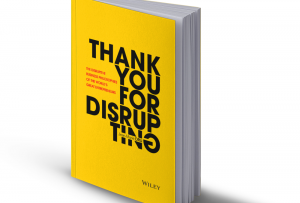Some individuals have a large impact on society and Thank you for disrupting is about their big ideas and underlying thinking.
Disruption is a well defined term now but many decades ago when it was introduced by Jean-Marie Dru that was not the case. The business culture was still wowed by continuous improvement methodology, and disruption had a negative connotation.
Lee Clow was Steve Job’s dedicated advertising partner and a friend from the very beginning of Apple. He was behind the famous 1984 “Think different” ad as well as the 66 “Mac versus PC” commercials.
According to Clow ideas accelerate change: they rule the world. He is not a believer of good ads but big ideas. Brands should associate themselves with powerful ideas that state what the brand stands for. A big idea works as a source of inspiration but also as a filter. They focus and provide consistency to the digitally disperse and fragmented marketing space.
Previously advertising was about producing creative messages to the audience. Now it’s about strong stories that create audiences from scattered media: users want to share the message to each other. Only the strong ideas and stories survive.
And they also have the best results. According to McKinsey the more creative the campaign the higher the likelihood that the featured product will sell. Creatively awarded campaigns seem to ensure also better returns with a less risk.
One of the leading trails between different persons from Steve Jobs, Lee Clow and Bernard Arnault (of LVMH) to Oprah Winfrey is their dedication to pay careful attention to detail. They are very involved with every aspect of the brand experience and how it is presented in the everyday mundane business aspects. Everything represents the brand and therefore it’s important.
Herb Kelleher is a legend in the airline industry. His Southwest Airlines broke the assumption that low cost equals low quality. Southwest puts its employees first and hires on attitude vs. skills. With a right company culture it has achieved revenues of over 35 billion and it has never laid off a single employee since its foundation in 1971. The staff is also the best compensated in the industry. Kelleher has stated his vision and strategy simply as low cost, superior service and people first.
Leading entrepreneurs consider their organisation to be in a continuous state of flux. A decentralised decision-making combined with a strong vision can drive a large number of people in a coordinated but yet agile fashion towards ambitious business goals. Organisations become vulnerable to disruption the moment they start to protect their turf and focus on incremental improvements.
Great companies create markets instead of focus on gaining market share. They keep their attention on business models and not just on products.
Big ideas and strong values move people.

